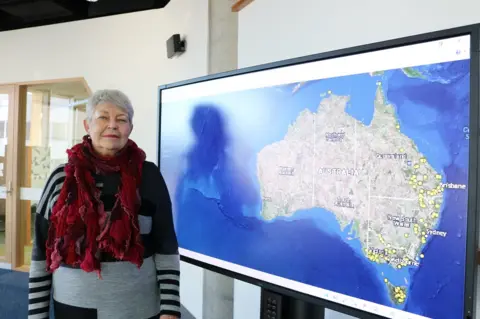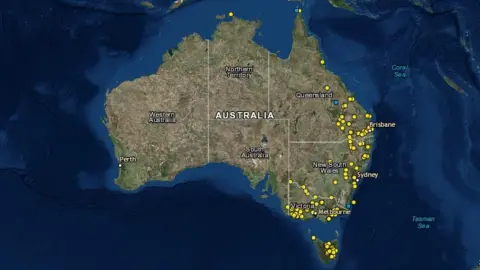Map charts early massacres of indigenous Australians
 University of Newcastle
University of NewcastleResearchers have created what they say is the most comprehensive map yet to detail the massacres of indigenous Australians by European settlers.
More than 150 locations feature on the online map, which presently covers only the nation's east coast.
The total number of deaths following British settlement in 1788 has long been debated, but many historians estimate it numbered tens of thousands.
Researchers hope the map will help with education and creating monuments.
The project includes details about the number of people killed at each site, which weapons were used, and who was responsible.
The information was compiled over four years and corroborated through sources including settler diaries, newspaper reports, court records and letters.
"For many Australians, this kind of information will come as a shock," project author Prof Lyndall Ryan told the BBC.
 University of Newcastle
University of Newcastle"Our ancestors were out there engaging in some pretty violent forms of behaviour."
More than 150 massacres affecting almost every Aboriginal clan took place between 1788 and 1872, compared with six recorded massacres of colonists during the same period.
A massacre was defined as the indiscriminate killing of six or more undefended people, the study said.
Prof Ryan said several violent events claimed more than 60 lives, while about 150 people were killed in one incident in Victoria's Gippsland region.
Call for recognition
Prof Ryan, a historian at Australia's University of Newcastle, said the team will document the country's west over the next two years.
She hopes it will help inspire memorials around Australia, similar to those acknowledging casualties in World War I.
"We are going to need monuments to realise that this was an ongoing war," she said.
"I hope it will lead to a clearer understanding of why the situation with Aboriginal people is still so desperate today."

You might also be interested in:

Discussion about better recognising Australia's first peoples has intensified this year, with a historic summit in May calling for a new formal body in parliament.
Earlier this year, the Australian government rejected calls to change the date of Australia Day, which commemorates the arrival of Britain's First Fleet, despite many indigenous Australians referring to it as "invasion day".
